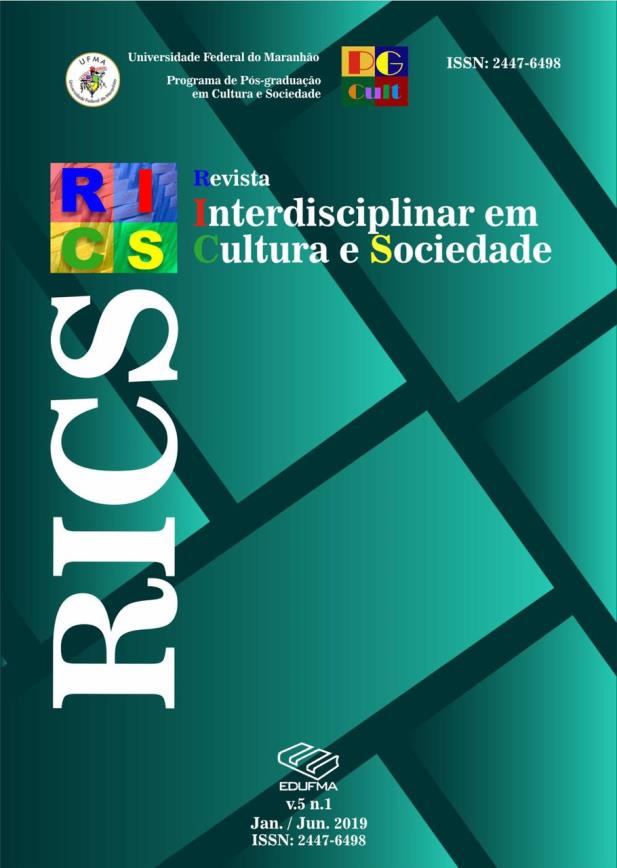Educação, Crítica e Emancipação: Uma Leitura Filosófico-Social do “IEMA”
Abstract
O projeto filosófico da Teoria Crítica, desde a sua gênese, foi a de pensar o “Social” identificando os problemas ali encontrados e propondo orientação de resolução para os mesmos. Sob o ponto de vista da filosofia social, ancorado nos pressupostos da pesquisa crítica, o “Social” é entendido pelas práticas, relações e instituições sociais enquanto condições constitutivas para o exercício da liberdade. No interior do “Social” e, de modo bem específico em nossa pesquisa no tocante ao programa social ‘Mais IDH’, a educação ocupa um lugar temático de pesquisa permitindo encetar, na interface educação e crítica, possibilidades para a transformação da sociedade. Levando em consideração a anterior exposição, queremos explicitar nesta pesquisa que o atual programa educacional maranhense – o IEMA – pode ser pensado a partir da teoria crítica como alternativa para responder às patologias sociais de cunho sociopolítico-educacional situadas no cenário maranhense na medida em que busca responder à questão da efetivação das condições mínimas de existência social de todos os assistidos pelo referido projeto pedagógico.Palavras-chave: O Social. Teoria Crítica. IEMA.
Education, Critical and Emancipation: a Philosophical-Social Reading of The "IEMA"
ABSTRACT
The philosophical project of the Critical Theory is thinking the “Social” and identify the social problems in order to resolution them. From the point of view of social philosophy, anchored in the presuppositions of critical research, the "Social" is understood by social practices, relations and institutions as constitutive conditions for the exercise of freedom. Within the "Social" and very specifically in our research on the social program 'More HDI', the education is established a thematic locus of research allowing to open at the interface education and criticism, possibilities for the transformation of our society.Taking into account the previous assumptions, we aim to make explicit in this research that the current educational social program - IEMA - can be thought from the critical theory as an alternative to respond to sociopolitical and educational social pathologies in the Maranhão States to the extent that we look for answer to the question of the realization of the conditions of social existence of all those assisted by the educational program.
Keywords: Social. Critical Theory. IEMA.
Downloads
Riferimenti bibliografici
AVRITZER, Leonardo, COSTA, Sérgio. Teoria Crítica, Democracia e Esfera Pública: Concepções e Usos na América Latina. DADOS – Revista de Ciências Sociais, Rio de Janeiro, v.47, n.4, p.703 – 728, 2004.
BANCO MUNDIAL. Quase Metade do Mundo Vive com Menos de USD $5.50 por Dia. Disponível em: <https://www.worldbank.org/pt/news/>. Acesso: 20 mar. 2019.
BAVARESCO, Agemir; Lima, Francisco Jozivan Guedes de; ASSAI, José Henrique Sousa (orgs.). Estudos de Filosofia Social e Política: Justiça e Reconhecimento. Porto Alegre: Editora Fi, 2015, 387p.
BENHABIB, Seyla. Critique, Norm, and Utopia: A Study of the Foundations of Critical Theory. New York: Columbia Press, 1986. 455p.
BRUNKHORST, Hauke. Kritik und Kritische Teorie. Baden Baden: Nomos, 2014. 396p.
DETEL, Wolfgang. Philosophie des Sozialen. Stuttgart: Reclam, 2013. 191p. (Grundkurs Philosophie Band 5).
FISCHBACH, Franck. Die Umtriebe des “Sozialen”. In: _______. Manifest für eine Sozialphilosophie. Bielefeld: Transcript Verlag, 2016. p.81 – 92.
FORST, Rainer. Normativität und Macht: Zur Analyse sozialer Rechtfertigungsordnungen. 1.ed. Berlin: Suhrkamp Verlag, 2015. 254p.
FORST, Rainer et.al. (org.). Sozialphilosophie und Kritik. 1.ed. Frankfurt am Main: Suhr-kamp Verlag, 2009. 743p.
FREIRE, Paulo. Pedagogia da autonomia: saberes necessários à prática educativa. 25. ed. São Paulo: Paz e Terra, 2002.
HERRMANN, Steffen. Ich – Andere – Dritte: Eine Einführung in die Sozialphilosophie. München: Verlag Karl Alber, 2018. 197p.
HERZOG, Lisa. Die soziale Dimension der Freiheit. In: _______. Freiheit gehört nicht nur den Reichen: Plädoyer für einen zeitgemäßen Liberalismus. München: C.H. Beck Verlag, 2014. p.12 – 15.
HONNETH, Axel. Philosophie als Sozialforschung: Zur Gerechtigkeit von David Miller. In: _______. Das Ich im Wir: Studien zur Anerkennungstheorie. 1. ed. Berlin: Suhrkamp Verlag, 2010. p.158 – 178.
IEMA (Instituto de Educação, Ciência e Tecnologia do Maranhão). Unidade Vocacional de Imperatriz. Disponível em: < http://www.iema. ma.gov.br/unidades-vocacionais/imperatriz/>. Acesso em 28 mar. 2019
IKÄHEIMO, Heikki, LAITINEN, Arto. Recognition and Social Ontology. Leiden: Brill, 2011. 398p.
IMESC (Instituto Maranhense de Estudos Socioeconômicos e Cartográficos). Produto Interno Bruto dos Municípios do Maranhão: período de 2010 a 2013. 2015. 73p.
_______. Mais IDH: mapas e indicadores dos 30 municípios com menor IDH do Estado do Maranhão. Disponível em: < http://imesc.ma.gov.br/atlas/Home/diagnostico>. Acesso em 28 mar. 2019.
INTERNATIONALE SOZIALPHILOSOPHISCHE TAGUNG “EMANZIPATION”, 2018, Berlin. Humboldt Universität, 2018.
INSTITUTO DE PESQUISA ECONÔMICA E APLICADA (IPEA). Radar IDHM: evolução do IDHM e de seus índices componentes no período de 2012 a 2017. Brasília: PNUD, 2019. 65p.
JAEGGI, Rahel, CELIKATES, Robin. Sozialphilosophie: Eine Einführung. München: C.H.Beck, 2017. 128p.
JAEGGI, Rahel, ALLEN, Amy. Progress, Normativity, and the Dynamics of Social Change. Graduate Faculty Philosophy Journal, Berlin, v. 37, n. 2, p. 225 – 251. 2016.
JAEGGI, Rahel. Kritik von Lebensformen. 2.ed. Berlin: Suhrkamp Verlag, 2014. 451p.
JAEGGI, Rahel, WESCHE, Tilo (org.). Was ist Kritik? 3.ed. Frankfurt am Main: Suhrkamp Verlag, 2013. 375p.
JAEGGI, Rahel. Was ist Ideologiekritik? In: JAEGGI, Rahel, WESCHE, Tilo (org.). Was ist Kritik? 3.ed. Frankfurt am Main: Suhrkamp, 2013. p. 268 – 295.
JAEGGI, Rahel. Was ist eine (gute) Institution? In: FORST, Rainer et.al. (org.). Sozialphilosophie und Kritik. 1.ed. Frankfurt am Main: Suhrkamp Verlag, 2009. p. 528 – 544.
JAEGGI, Rahel. Repensando a Ideologia. Civitas, Porto Alegre, v.8, n.1, p.137 – 165, 2008.
MARANHÃO (Estado). Secretaria de Estado do Planejamento e Orçamento. Instituto Maranhense de Estudos Socioeconômicos e Cartográficos. Plano de Ação Mais IDH. São Luís, 2015. 113p.
MARANHÃO (Estado). Secretaria de Estado do Planejamento e Orçamento. Instituto Maranhense de Estudos Socioeconômicos e Cartográficos. Plano de Ação Escola Digna. São Luís, 2015.
MARANHÃO (Estado). Iema: Plataforma Contrata Aê. Disponível em:< https://contrataae. iema.ma.gov.br/>. Acesso em 30 mai. 2019.
NOBRE, Marcos (org.). Curso Livre de Teoria Crítica. Campinas: Papirus, 2008. 302p.
NOBRE, Marcos. A Teoria Crítica. 3.ed. Rio de Janeiro: Zahar, 2004. 54p. (Coleção Filosofia Passo a Passo 47)
PINZANI, Alessandro. Justiça social e carências. In: PINZANI, Alessandro, TONETTO, Milene (org.). Teoria Crítica e Justiça Social. Florianópolis: Nefipo, 2013. p.133 – 159.
_______. Teoria Crítica e Justiça social. Civitas, v. 12, n.1, p. 88-106, jan / abr. 2012.
SCANLON, T. M. Preference and Urgency, The Journal of Philosophy, v.72, n. 19, Princeton, p. 655 – 669, 1975.
SIMMEL, Georg. Der Arme. In: _______. Soziologie: Untersuchungen über die Formen der Vergesellschaftung. Leipzig: Duncker & Humboldt, 1908. p.454 – 493.
SEN, Amartya. On Economic Inequality. Oxford: Clarendon Press, 1973.
_______. Desigualdade reexaminada. Tradução Ricardo Mendes. Rio de Janeiro: Record, 2001. 301p.
_______. Poverty and Famines: Na Essay on Entitlement and Deprivation. Oxford: Clarendon Press, 1981. 257p.
STAHL, Titus. Immanente Kritik: Elemente einer Theorie sozialer Praktiken. Frankfurt am Main: Campus Verlag, 2013. 475p.
STEMMER, Peter. Normativität: Eine ontologische Untersuchung. Berlin: De Gruyter, 2008. 370p.
STREETEN, Paul P. Thinking About Development. Cambridge: Cambridge University Press, 1995.
WESCHE, Tilo. Reflexion, Therapie, Darstellung: Formen der Kritik. In: Jaeggi, Rahel; Wesche, Tilo (org). 3.ed. Was ist Kritik? Frankfurt am Main: Suhrkamp, 2013. p. 193-220.
WINTER, Rainer, ZIMA, Peter (org.). Kritische Theorie heute. Bielefeld: Transcript Verlag, 2007. 319p.
Downloads
Pubblicato
Come citare
Fascicolo
Sezione
Licenza

Este trabalho está licenciado com uma Licença Creative Commons Atribuição 4.0 Internacional. Os autores da Revista Interdisciplinar em Cultura e Sociedade mantêm os direitos autorais.


















